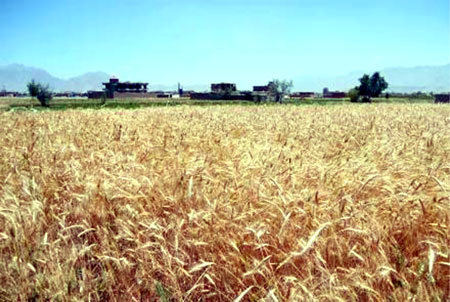The Food and Agriculture Organization of the UN said the World Bank contributed $150 million to provide critical livelihood and life-saving assistance to the most vulnerable rural populations in Afghanistan.
The FAO said that it will focus on wheat production, supporting about 2.1 million people.
The Ministry of Agriculture, Irrigation and Livestock welcomed the World Bank’s financial support and said it will help Afghan farmers.
“In normal years, we import 1 to 1.5 million tons of wheat. In the years of drought, we import 2 to 2.5 million tons,” said Musbahuddin Mustayeen, a spokesman for the ministry.
The Chamber of Agriculture and Livestock urged the Islamic Emirate to invest the money in infrastructure.
“Our proposal to the Islamic Emirate is to spend the money on Afghanistan’s infrastructure,” said Mirwais Hajzada, a member of the chamber.
This comes as the Afghan farmers complained about the lack of sufficient water for irrigation.
“We irrigate it via wells but it has dropped widely now,” said Mohammadullah, a farmer.
“I have spent 1,200 Afs on it and I have made a lot of effort but now the crops have been reduced,” said Abdul Haleem, a farmer.
The World Bank has resumed work on three projects in Afghanistan focused on health, agriculture and livelihoods, but will maintain a hold on some $150 million for education projects, two sources familiar with the decision said Tuesday.
The multilateral development bank had put all four projects, valued at around $600 million, on hold in late March, citing its deep concerns over the Islamic Emirate’s ban on girls attending public high school.
Group of Seven partners and other major donors to the Afghanistan Reconstruction Trust Fund (ARTF) will meet to discuss the country’s mounting economic and food security problems on Friday during the spring meetings of the International Monetary Fund and the World Bank, the U.S. Treasury announced on Monday.
Some multilateral organizations, including the IMF, the United Nations Assistance Mission in Afghanistan (UNAMA) and the Islamic Development Bank, will also take part, one of the sources said.
When it halted work on the four programs, the World Bank noted that its policies required all ARTF-financed activities to support access to – and equity of services for – women and girls in Afghanistan.
Officials decided to “resume preparations” for the three non-education projects, valued at around $450 million, given the deepening economic crisis in Afghanistan worsened by rising food and energy prices triggered by Russia’s war in Ukraine, one of the sources said.
Russia calls its actions “a special military operation.”
The World Bank last week issued a dire outlook for Afghanistan’s economy, noting that per capita income had fallen by over a third in the last four months of 2021 following the seizure of power by the Islamist Taliban as U.S.-led foreign forces withdrew.
It said around 37% of Afghan households did not have enough money to cover food while 33% could afford food but nothing more.
When it agreed to free up ARTF funds for new projects to be implemented by U.N. agencies, the World Bank had stipulated that it expected a “strong focus on ensuring that girls and women participate and benefit from the support.”—Reuters








